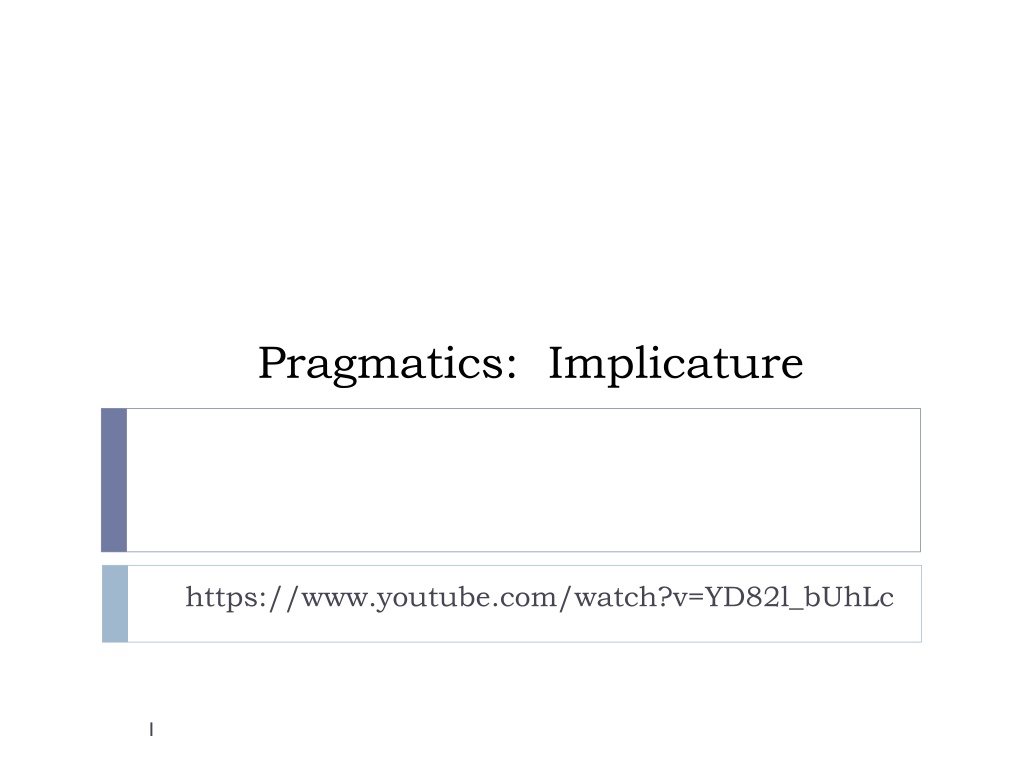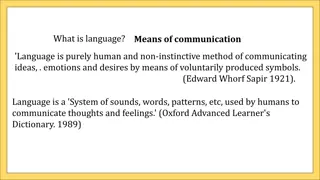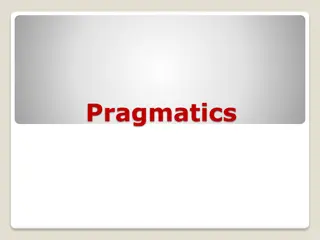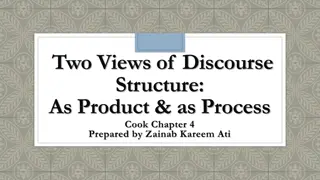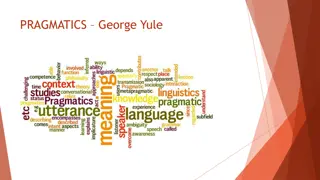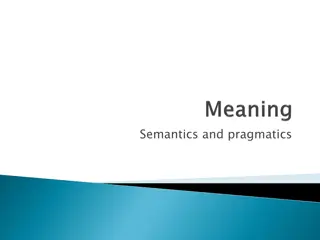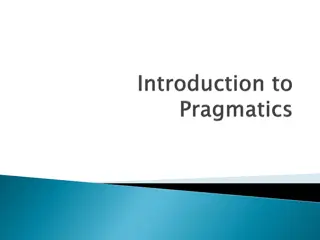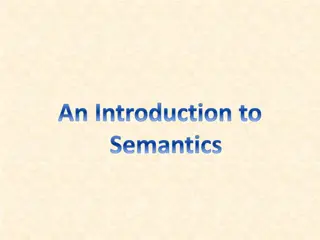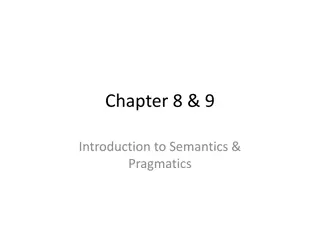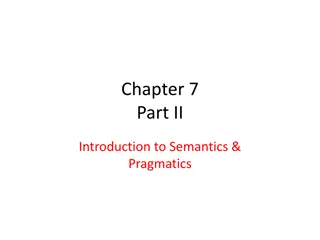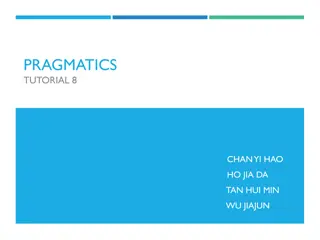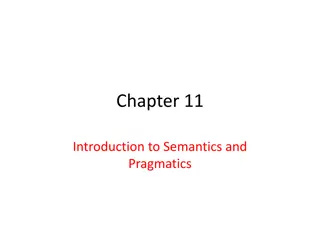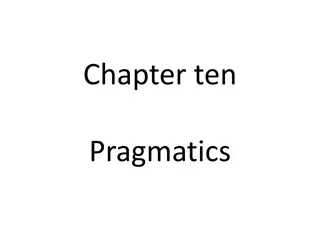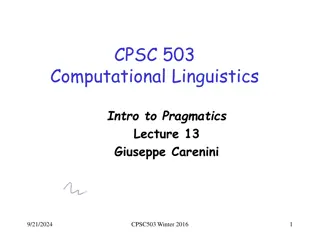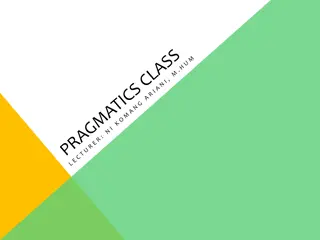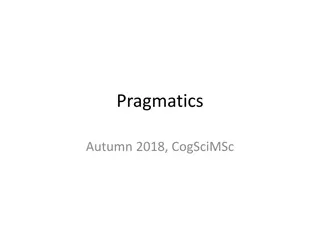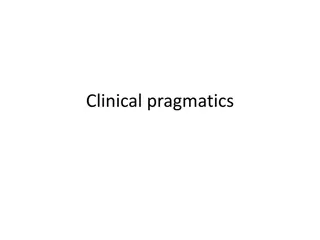Understanding Implicature in Pragmatics
Explore the concept of implicature in pragmatics, distinguishing it from entailment, identifying types of implicatures, and understanding how implicatures are context-dependent and cancellable. Delve into examples and implications of implicature in communication.
Download Presentation

Please find below an Image/Link to download the presentation.
The content on the website is provided AS IS for your information and personal use only. It may not be sold, licensed, or shared on other websites without obtaining consent from the author. Download presentation by click this link. If you encounter any issues during the download, it is possible that the publisher has removed the file from their server.
E N D
Presentation Transcript
Pragmatics: Implicature https://www.youtube.com/watch?v=YD82l_bUhLc 1
Objectives We will be able to get acquainted with implicature. distinguish between an implicature and an entailment. identify types of implicatures. 1. 2. 3. 2
Food for thought What does she say? What does she mean? I want to know whether you are going to wear that tie. You are not really planning to go in public wearing that tie, are you? Sentence meaning Speaker meaning Semantic meaning Pragmatic meaning entailment implicature 3
Implicature and Entailment What is an entailment? What is an implicature? any meaning which is conveyed indirectly or through hints, and understood implicitly without ever being explicitly stated. a meaning that is present on every occasion when an expression occurs. (Grundy: 2000, 73) (Grundy: 2000, 73) A: Would you like some coffee? B: It will keep me awake. Entailment=> Implicature +> 4
Implicature and Entailment Entail: is meant to cover the family of verbs that refer to the literal meaning of a sentence, such as say and assert . Implicate: is meant to cover the family of verbs such as imply , suggest , mean , which refer to the meaning of an utterance as understood in a given context. 5
More Examples A: Will Sally be at the meeting this afternoon? B: Her car broke down. Entailment=> .. Implicature+> . A: Do you like linguistics? B:. Well, let s just say I don t jump for joy before class Entailment => Implicature +> .. An advertisement of Coca-Cola says: It s the taste. Entailment => Implicature +> . 6
Implicatures are context-dependent An expression with a single meaning (expressing the same proposition) can give rise to different conversational implicatures in different contexts. Example: It s the taste. +> It is the unique taste that people look for. A slogan in an advertisement for Coca Cola An utterance made by a daughter to answer why she left her sandwich intact. +> I found the taste awful. An utterance made by a shop assistant about a product +> The product is in vogue . 7
Implicatures are cancellable An implicature can be cancelled if additional premises are added without causing contradictions. John is visiting Pat. He and Pat are watching TV. in a room with open windows. John says: It s a bit chilly here +> I want to have the windows closed => The temperature is low. John may go on and add: It s a bit chilly in here, but I do not want you to close the windows. 8
CONVERSATIONAL IMPLICATURE The basic assumption in conversation is that, otherwise indicated, the participants are adhering to the cooperative principle and the maxims. The following examples show a speaker conveying more than he said via conversational implicature
a: I hope you brought the bread and cheese. b: Ah, I brought the bread. Speaker B assumes thatA infers that what is not mentioned was not brought. a: Do you like ice-cream? b: Is the Pope catholic?
Types of Implicature Conversational Implicature Implicature Conventional implicature 11
Types of Implicature Particularized Indefinite Conversational Implicatures Generalized Conventional Scalar 12
Conversational Implicature Conversational implicatures are the assumptions suggested by the speaker and inferred by the hearer in an exchange situation. These assumptions are not encoded in the words said but are generated by the interlocuters cooperation to achieve rational communication. Cooperation Speaker Hearer The cooperative principle 13
The Cooperative Principle Relevance It is an umbrella term for the principles that guide our conversation. Meet certain principles Grice called these rules Maxims of Conversation. Make your conversational contribution such as is required, at the stage which it occurs, by the accepted purpose or direction of the talk exchange in which you are engaged. The maxims are: The Quality Maxim (truthfulness) The Quantity Maxim (informativeness) The Relevance Maxim Truthfulness Informativeness manner Manner Maxim 14
Types of Conversational Implicatures Particularized CI Conversational implicatures Generalized CI 15
Particularized Conversational Implicature Leila: Wow! Has your boss gone crazy? Mary: Let go get some coffee Leila has walked into Mary s office and noticed all the work is on her desk. She has addressed Mary without realizing that the Boss is in some corner in the office. A: I m going to the prison tomorrow. B: Will 200Dhs do? Particularized conversational implicatures are the inferences which are worked out while drawing totally on the specific context of the utterance. A is visiting a detainee and proposing to B to help in funding the shopping for that detainee. 16
Generalized Implicature A: Did you invite Bella and Cathy? B: I invited Bella. +> While working out generalized CI no special background knowledge of the context of utterance is required in order to make the necessary inferences . Yule (1996:40) A: Did you buy bread and cheese. B: I bought bread. +> 17
Generalized Conversational Implicatures Phrases with indefinites a / an I was sitting in a garden one day. A child looked over the fence. +> An X +> not speaker s X There is a car in front of the house. +> .. 18
Scalar Implicatures Scalar implicatures are given rise by the use of certain scales of value. The use of one expression indicates one point on the scale and cancels the other expressions indicating higher points on the scale. <All, most, some, few> <always, often, sometimes> <certain, probable, possible> <do badly, progress, do well> Some of the boys went to the party. +>not all of the boys went to the party. 19
Scalar Implicature The courses are sometimes interesting. +> the courses are not always/ not often interesting. It s possible that they were delayed. +> It s not certain/ not probable that they were delayed. 20
Scalar Implicature I can t lend you 10$. +> I can t lend you more 10$. 21
Types of Implicatures Particularized Indefinite Conversational Implicatures Generalized Conventional Scalar 22
Conventional Implicatures Conventional implicatures are associated with specific words and result in additional conveyed meanings when those words are used. She put on her clothes, and left the house. p q +> After she had put on her clothes, she left the house. +> q after p She was happy and ready to work. p q +> she was both happy and ready to work. +> p plus q 23
CONVENTIONAL IMPLICATURES In contrast to the previous implicatures, these ones are NOT based on the cooperative principle s maxims. They do NOT have to occur in conversation and don t depend on special contexts for interpretation. They are associated with SPECIFIC WORDS and result in additional conveyed meanings.
For example: the English conjunctions BUT and AND The interpretation of any utterance with the word BUT will imply an implicature of CONTRAST and with AND anADDITION. Mary suggested black, but I chose white . The words EVEN and YET also have conventional implicature. Even implies contrary to expectation. Yet implies that the present situation is expected to be differerent at a later time.
Conventional Implicatures +> In contrast to what John should feel as a poor person, he is happy. John is poor but happy. p q P but q +> p is in contrast to q 26
Conventional Implicatures +> Denis is expected to be here later. Not p yet +> p is expected to be true later. Denis isn t here yet. not p 27
Conventional Implicatures Even Mary came to the party. p +> contrary to what was expected, Mary came to the party. Even p +> contrary to what is expected, p. 28
